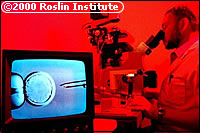Italian scientists use adult stem cells to tackle multiple sclerosis
Researchers at the San Raffaele Hospital in Milan have used injections of stem cells from adult mice to cure mice suffering from the paralysis associated with one form of multiple sclerosis (MS). It is hoped that a similar process could one day be used to treat humans with MS. Using stem cells from adults would bypass the controversy and ethical debate associated with the use of embryonic stem cells. One million cells were injected into the bloodstreams of 15 paralysed. After 10 days the mice became increasingly active, and four went on to recover full and normal movement. The remaining 11 retained only minor tail paralysis. 'It's a great recovery,' said researcher Angelo Vescovi from San Raffaele's stem cell research institute. The team discovered that the cells had migrated to and repaired damaged nerves and areas of the brain. In particular, they believe that the stem cells were able to replace the fatty myelin coating of brain cells, which are stripped as a result of the disease. More than a million people worldwide suffer from multiple sclerosis, and currently the disease is incurable. Symptoms include fatigue, tremors and paralysis. Many scientists regard the possible use of adult stem cells in such treatments as an alternative to embryonic stem cells. But while adult stem cells have the ability to turn into many different types of cell within the body, Dr Vescovi would not like to see a halt to research using embryonic stem cells, which are believed to be more versatile and are much easier to collect. The team has already begun experiments in which primates suffering from the symptoms of MS are given human adult stem cells, and future research will analyse the effectiveness of embryonic stem cells in the same subjects. On finding a similar cure for MS symptoms in humans, Dr Vescovi is, however, cautious. He stresses that success in experiments using mice is no guarantee that the procedure will work in humans, adding: 'I wouldn't want to raise expectations.'
Countries
Italy



